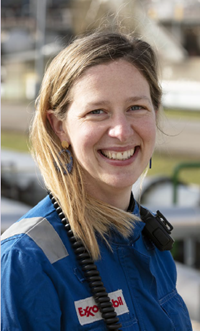selected item
Heleen Witdouck moved in the opposite direction

How did you end up at the refinery?
Heleen Witdouck: "It was also a surprise to me, but when I returned from maternity leave from my second child, I was offered this assignment. The idea was to strengthen the integration between the refinery and the business. This usually goes in the other direction: people move from the refinery to Brussels Campus. But this move was made to add a customer-centric perspective to my business experience in the truck and train loading terminal.
That must have been quite the adjustment?
Absolutely, I already had had sales jobs where I was often with customers, but as a terminal manager I really have both feet in the field, close to the product. An environment that is in any case much more pragmatic and no-nonsense than an office job in Brussels. The moral of getting things done really reigns here. As a commercial engineer I ended up in a position with a technical background. So I had to learn a lot.
How did you do that?
By daring to ask many open questions. I was a bit afraid of it in the beginning, as I was a woman with only experience within commercial departments at that time. But I was very fortunate to end up in a team with a very open mindset. The 37 operators from the five-day team, my immediate team and the colleagues from the Business Team, have had a lot of patience to answer all my questions. I learned a lot from them, not only from their expertise but also from their mentality to move forward as a team. Conversely, I also hope that I have already been able to contribute by looking at things in a different way and thinking out-of-the-box.
Has it been an enrichment for you as well?
As a terminal manager I am the coordinator of the daily ins and outs. I spend half the time on day-to-day business, the other half more on short or long-term projects. If I go back to Brussels, this experience is therefore particularly interesting because I now have a better understanding of the processes and structures of a refinery and why certain things take their time. From the perspective of the office in Brussels it sometimes seems obvious to carry out a repair, but now I know what precedes it. And it is also very interesting to get to know the different characters in a team of 37 people, including 2 female operators. Human interaction is much more direct. In any case, I enjoy working in a "man's world", so I consciously chose a job in the industry 12 years ago.